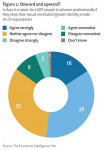The squeeze is on for Asian families struggling to provide for children and elderly parents
These findings are among the results of a survey of 700 people in Australia, China, Hong Kong, Japan, Singapore, South Korea and Taiwan who are currently supporting both their children and their parents. The aim of the survey, which was conducted by the Economist Intelligence Unit in March and April 2010, was to ascertain how the burden of supporting parents and children affects the decisions of working-age adults in relation to their disposable income and investment/saving behaviour.
The other key findings of the report are as follows:
· Asia’s Sandwich Generation is saving for retirement, but many anticipate a reduced standard of living. For the most part, members of Asia’s Sandwich Generation are contributing to public and private pensions or insurance policies, but 42% expect their standard of living to fall once they leave the work force. South Korean and Japanese Sandwich Generation members display the highest level of anxiety about their retirement years. Regardless of their projections for the future, few Asian Sandwich Generation members (just 16%) seek professional advice in financial planning.
· The Sandwich Generation is working harder, saving less and taking fewer risks with their investments. More than one-third of Asia’s Sandwich Generation members have had to work harder to cover family expenses since becoming “sandwiched”; about half have reduced their savings and investments, and nearly two-thirds are more cautious with their existing investments than they would otherwise be.
· Many are struggling under the pressure. More than one-third, 36%, of Sandwich Generation members say they are “struggling to cope” with the competing demands of their parents and children. Those in Hong Kong are feeling the most pressure, with 53% of respondents reporting they are struggling to cope.
· The pressures of supporting parents and children have grown, but dedication to ageing parents remains strong. As longevity has risen and women are having children later, families are simultaneously caring for young children and ageing parents more than in the past. But although the demands may have increased, the Asian Sandwich Generation’s sense of filial obligation remains strong, with 78% agreeing that it is their responsibility to help their ageing parents.
· Education is a major expense for the Sandwich Generation, but they are willing to pay handsomely for the investment in their children’s future. Asian Sandwich Generation members spend more time and money caring for children than parents, and their children’s education is the primary concern. Educational expenses, which can be considerable, start as early as primary school. Many expect to continue paying for their children into early adulthood: some 58% regionally (and 73% of Sandwich Generation members in Taiwan) say they expect to care for their children into their 20s.
· Caring for parents can also be expensive, especially where the social safety net is weak. In regions where the elderly often lack pensions or access to public healthcare services, the burden is heavier than elsewhere on Sandwich Generation members to cover their parents’ costs. Sandwich Generation members in China and Hong Kong spend more on their parents than their Asian peers, a result in part of weak social security systems that provide little support for retirees or their families.
About the research
For this report the Economist Intelligence Unit surveyed 700 individuals in Australia, China, Hong Kong, Japan, Singapore, South Korea and Taiwan (100 per country). Survey findings for “Asia” in this report refer to aggregate results across these countries. Survey respondents were between the ages of 21 and 70 and supporting at least one child and one parent. Both sexes were equally represented.
The survey sample included only people who fall into the “ABC1” socioeconomic classification (that is, “middle class” workers earning local median income levels and above, or with comparable purchasing power). In conducting the survey, the principal goal was to ascertain how the burden of supporting parents and children affects the decisions of working-age adults in relation to their disposable income and investment/saving behaviour. Low-income earners typically do not have the financial means to support multiple generations, nor are likely to alter their investment, saving or retirement planning (if any) given the burden of caring for multiple generations. As such they are not considered as part of the Sandwich Generation in this report.
About the Economist Intelligence Unit
The Economist Intelligence Unit is the business information arm of The Economist Group, publisher of The Economist. Through our global network of more than 650 analysts and contributors, we continuously assess and forecast political, economic and business conditions in more than 200 countries. As the world's leading provider of country intelligence, we help executives make better business decisions by providing timely, reliable and impartial analysis on worldwide market trends and business strategies. For more information, please visit www.eiu.com or follow us on www.twitter.com/theeiu
About Fidelity International Fidelity International provides investment products and services to individuals and institutional investors outside of the Americas, ranging from mutual funds and defined contribution pensions, to segregated portfolios and multi-manager products. Fidelity International has been in Asia for 40 years, employs over 4,000 people globally and has offices in 23 countries including Japan, Korea, Australia, Hong Kong, Taiwan, Singapore and China. Fidelity International is responsible for managing client assets of US$210 billion as of 30 December 2009 and has one of the largest proprietary research teams in the world, providing insights into around 90% of the world's stock markets as measured by the Morgan Stanley Capital International World Index. http://www.fidelity-international.com/
웹사이트: http://www.eiu.com
연락처
Joanne McKenna
Press Liaison
+44 (0)20 7576 8188
이메일 보내기
이 보도자료는 Economist Intelligence Unit가(이) 작성해 뉴스와이어 서비스를 통해 배포한 뉴스입니다.




